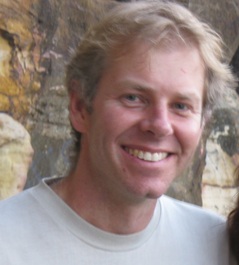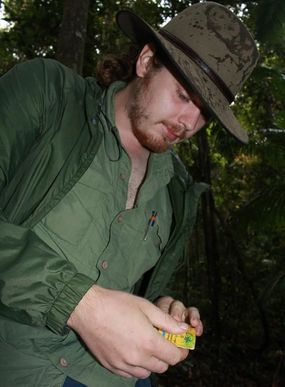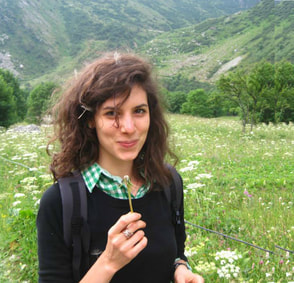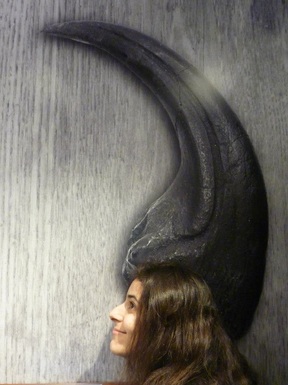Matt Phillips

I am fascinated with biodiversity and how it is shaped by interactions between organisms, genetic architecture, and the environment. Much of my earlier research was on phylogenetic methods, with a view to using them as a tool for understanding processes that underpin evolution and extinction. I am not a specialist, instead I prefer to integrate molecular, morphological, fossil and ecological sources of data. I have worked with animals as diverse as amphipods, dinosaurs, moa and sabretooth cats, although tend to focus on marsupials.
Australian marsupials are a great group for studying evolution. They have evolved much of the functional and ecological diversity of placental mammals, but in relative isolation as a long coevolved ‘unit’, in contrast to the intermittent faunal mixing among Northern Hemisphere placentals. As such marsupials provide a simpler system for identifying evolutionary influences, including for explaining puctuational evolution and niche conservatism.
Australian marsupials are a great group for studying evolution. They have evolved much of the functional and ecological diversity of placental mammals, but in relative isolation as a long coevolved ‘unit’, in contrast to the intermittent faunal mixing among Northern Hemisphere placentals. As such marsupials provide a simpler system for identifying evolutionary influences, including for explaining puctuational evolution and niche conservatism.
Yasara De mel

I find population ecology of animals linked with conservation genetics, a fascinating area of research,
mainly of mammals and birds. I aspire to conduct field-based research to answer ecological
questions by using genetics as a tool towards the conservation of wildlife.
Before I joined Phillips lab, I studied about the habitat relations and genetic variations of Asian
elephants in my home country Sri Lanka.
For my PhD, I will be looking at colonization event of birds from New Caledonia and New Zealand.
And I will be using novel molecular dating techniques to estimate the timing of colonization of these
birds from the mainland “Australia”. This will help me better understand the interactions between
ecological adaptation and population genetic processes on islands which may help to inform
conservation management for islands and potentially, for future dispersal into novel environments
predicted by climate modelling.
mainly of mammals and birds. I aspire to conduct field-based research to answer ecological
questions by using genetics as a tool towards the conservation of wildlife.
Before I joined Phillips lab, I studied about the habitat relations and genetic variations of Asian
elephants in my home country Sri Lanka.
For my PhD, I will be looking at colonization event of birds from New Caledonia and New Zealand.
And I will be using novel molecular dating techniques to estimate the timing of colonization of these
birds from the mainland “Australia”. This will help me better understand the interactions between
ecological adaptation and population genetic processes on islands which may help to inform
conservation management for islands and potentially, for future dispersal into novel environments
predicted by climate modelling.
|
Gabriele Sansalone
|
|
Dr. Gabriele Sansalone (Research Fellow, University of New England) is a Research Fellow at UNE in the Palaeoscience Research Centre. Dr. G. Sansalone is a vertebrate paleontologist specialized in the use of quantitative shape analysis, phylogenetic comparative methods and finite elements analysis. His work is focused on understanding the adaptation and evolution of vertebrates, with particular interest In subterranean mammals evolution, birds of prey feeding adaptation, primates brain and cranial evolution. Currently one of his main projects is focused on the feeding biomechanics of marsupial and placental carnivores.
|
Sarah Shazwani Zakaria
Manuela Cascini
|
I have always been curious about the diversity of species and my main scientific interest is in understanding how evolution works. My PhD project explores the evolutionary trajectory of the Australasian mammal fauna and what makes it different from the other continental mammal faunas. For my research I use a phylogenetic approach that combines molecular, ecological and fossil data sets.
Prior to that I worked on conservation genetics and studied the hybridization between wolves and dogs in Italy. Mammals aside, my earliest research was on a particular group of Anellidae. In fact I also have a fanaticism for earthworms and other things invertebrates. |
Mélina Celik
|
I am fascinated by the evolutionary history of organisms, their evolutionary relationships and the usefulness of phylogenetics in conservation aspects. In my Phd project I focus on marsupial evolution. I will look into the different morphological and molecular levels by bringing morphology (from fossils and living species) and DNA information together. One of the main objectives of my project is to better date the marsupial tree.
|
Adam Stone

I have always been interested in how interactions between organisms can shape ecological communities. Prior joining the Phillips lab I studies how interactions between feral and native species may shape future ecological communities, now my PhD looks backwards investigating how historic ecological interactions have shaped present day assemblages. I use phylogenetic techniques to explore how ecological interactions between bats and birds may have led to ecological partitioning and contributed to the the overwhelming preference for nocturnality in bats and diurnality in birds.
Previous and associate lab members
Kaylene Butler: Vertebrate Palaeontology, Ecology, Evolutionary biology.
Carmelo Fruciano: Morphometric, biology, evolutionary biology. Post-doc at Ecole Normale Superieure / IBENS / CNRS
Chloe van der Burg: Marsupial DNA and transcriptomic sequencing, Lab Assistant at Queensland University of Technology (now PhD Student at QUT with Peter Prentis).
Hannah Maloney: Evolution of the genus Macropus, Honours Student at Queensland University of Technology.
Kieren Mitchell: Mammalian and avian evolution, PhD student at Adelaide University, with Alan Cooper (now ARC Postdoctoral Research Associate).
Margarita Medina: Marsupial diversity, PhD student with Carlos González-Orozco at University of Canberra.
Héctor Ramirez-Chaves: Mammalian middle ear evolution, PhD student at University of Queensland, with Vera Weisbecker.
Alicia Grealy: Ratite evolution, PhD student at Curtin University, with Mike Bunce.
Peter Bishop: Vertebrate palaeontology and biomechanics
Will Dodt: Evolution of kangaroos, including their retrotransposons





